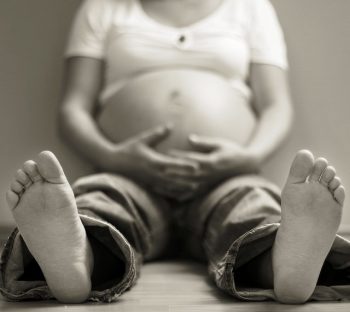Postpartum Chinese Tradition: The Sitting Month Posted by Ayana on Aug 27, 2018 in Culture
An old Chinese custom became controversial in recent years: the 坐月子 (zuò yuè zi) tradition. 坐 (zuò) means “to sit”, 月 (yuè) means “month”, and 月子 is the first month after giving birth. This ancient practice takes care not of the new born, but of the new mom, who have just been through a long, painful procedure.
妈妈 māmā = mom
身体shēntǐ = body
分娩 fēnmiǎn = to give birth
恢复 huīfù = to recover
Giving birth can take hours and hours of arduous contractions. After the exhausting delivery, the body needs to heal not only from the delivery itself, but from the long pregnancy as well, all while sustaining the fatigue that follows the milk production and the breastfeeding every three hours. The Chinese believe it takes about a month for a woman’s body to recover.
妈妈们分娩后逐渐恢复。
Māmāmen fēnmiǎn hòu zhújiàn huīfù.
Mothers gradually recover after childbirth.
During this time, the new mom’s body is still weak and can easily get sick. Mothers, hence, must rest a lot and strictly avoid any chance of getting cold. Although 坐月子 is translated to “the sitting month”, the women definitely don’t have to sit all month long. It is highly recommended, though, to stay at home as much as possible and mainly to rest.
产chǎn = to give birth, to produce
休息xiūxí = to rest
产后的妈妈们的确要注意休息。
Chǎnhòu de māmāmen díquè yào zhùyì xiūxí.
Postpartum moms need to rest.
To avoid catching cold or other illness, women must avoid exposure to wind, or being wet for too long. They should stay at home, wear warm clothes, give up hair washing, take a shower over a bath, stay away from open windows and air conditioning. These specific recommendations provoked rumors that gave a bad name to the sitting month practice. People heard women are not allowed to take a shower, brush their teeth, or eat vegetables and other cold dishes. This animated video is determined to refute those hearsays:
讲究jiǎngjiù = to be particular about
忌jì = to avoid
风fēng = wind
坐月子通常讲究忌风。
Zuò yuè zi tōngcháng jiǎngjiù jì fēng.
The sitting month practice stresses avoiding wind.
The pregnancy is over, the childbirth is behind, but the Chinese believe that the woman’s body still works hard during the 月子. The womb shrinks back to its size, and the body regenerates blood that had been lost during delivery. To encourage milk production and strengthen up the body, Chinese, as always, focus on nutrition as well. They instruct new moms to eat a lot of eggs, beans, chicken soup and pork liver. If you are looking for a specific recipe for new moms you are welcome to watch this cooking show:
中医师zhōngyī shī = Chinese medicine practitioners
猪肝zhū gān = porcine liver
补益bǔyì = to help, to benefit
中医师建议主食可以猪肝为主, 猪肝补益气血。
Zhōngyī shī jiànyì zhǔshí kěyǐ zhū gān wéi zhǔ, zhū gān bǔyì qì xuè.
Chinese medical practitioners recommend pork liver as main dish, since pork liver benefits the blood and the qi.
As with any long lasting custom, 坐月子 is exposed to current events. The appearance of Kate Middleton, Duchess of Cambridge, for instance, in light clothes outdoors less than a day after giving birth, aroused wonder among Chinese internet citizens. Check out this Chinese article, for example.
Nowadays, not all Chinese observe the sitting month practice. Many, though, still do and some of them take it too seriously. In 2015, a Shanghai mom had died from heatstroke after strictly observing the tradition. Despite the hot weather outside, the woman stayed in bed wrapped with thick covers and without air condition. For more details check out this article in English.
While most Chinese youngsters still stick to the tradition, cases like this arouse debate. 坐月子has been followed generation after generation, but nowadays, some voices, like this writer for example, call to abandon the antiquated practice:
坐月子是一种落后的文化。
zuò yuè zi shì yī zhǒng luòhòu de wénhuà.
The sitting month is a backward tradition.
随着现代生活水平的提高和科学技术的发展,很多禁忌确实也不再不合时宜。
suízhe xiàndài shēnghuó shuǐpíng de tígāo hè kēxué jìshù de fǎ zhǎn, hěnduō jìnjì quèshí yě bù zài bu hé shí yí.
With the improvement of modern living standards and advances in medicine and science, many taboos are indeed no longer appropriate.
Another modern change to the custom is the 月嫂 (yuè sǎo) – a midwife who takes care of the new born and the new mom. She is paid around 8,000 Yuan a month to live with the new parents. She cooks for the mom and her family, and helps taking care of the infant. A Chinese friend once told me, that the only one who truly enjoyed the 月嫂in their family was her husband, who had to do nothing during the 月子. Meanwhile, my friend herself had to eat dishes she didn’t like, and to be under supervision all this month. But it was long ago – my friend’s son is a happy naughty 10 year old boy. My friend is glad that she kept the tradition of her parents and did the right thing for her body.
好好学习,天天向上!

Build vocabulary, practice pronunciation, and more with Transparent Language Online. Available anytime, anywhere, on any device.





Leave a comment: